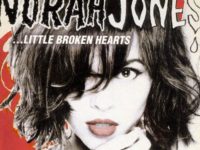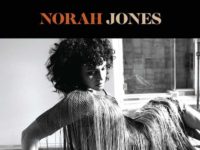At first blush, this Danger Mouse-produced effort sounds like post-modern mood music, with Jones’ reliably languid cries of loneliness surrounded by gurgling synths, fuzzy guitars and swooning strings. But there’s something else going on here: Jones is moving out of her cozy cocktail jazz-pop environs on Little Broken Hearts — due May 1, 2012, from Blue Note — and not just by inviting over Brian Burton, who as producer Danger Mouse is perhaps most famous for his work with Cee Lo Green in Gnarls Barkley.
Sure, on its surface, this has the feel of a Danger Mouse record featuring Norah Jones, rather than the other way around — like a continuation of her guest turn on the producer’s recent tribute to Italian film music. From the tinker-toy groove of “Say Goodbye,” to the disassembled rockabilly of Jones’ title track, to the thumping tough-girl pop of “Happy Pills,” to the slinky apocalyptic country twang of “All a Dream,” Little Broken Hearts couldn’t sound less like the Norah Jones we’ve come to know over her first quartet of albums.
That also holds true, however, in ways that have nothing to do with the music. Dig deeper into the lyrics and you hear Jones pushing at the edges of her own narratives, too. The shy part-time waitress whose surprise 20-million-copy-selling debut stole away with eight trophies at the 2003 Grammy Awards is nowhere to be found on this project’s angry revenge fantasies (“Miriam, that’s such a pretty name, and I’ll keep saying it until you die”) and sharply emotional recriminations (“Does she make you happy? I’d like to see you happy.”)
Working with Danger Mouse has opened up new vistas for Jones, the daughter of 90-something Indian sitar maestro Ravi Shankar who grew up with her mother in Grapevine, Texas — far away from those L.A. red-carpet scenes. Where her earlier music played out like melancholic personal ruminations, Little Broken Hearts sounds like a writer trying out different voices.
In so doing, she often gets closer to catharsis, to real emotion, than she ever has. Outside her own comfort zone, maybe even outside her own feelings, Jones strikes some of the most powerful chords yet. This isn’t her first record about a broken heart (check out 2009’s The Fall, issued in the wake of her split with bassist Lee Alexander), but Little Broken Hearts may be — despite the layers of sleek new sounds — her most direct and honest.
- Nick DeRiso’s Best of 2015 (Rock + Pop): Death Cab for Cutie, Joe Jackson, Toto + Others - January 18, 2016
- Nick DeRiso’s Best of 2015 (Blues, Jazz + R&B): Boz Scaggs, Gavin Harrison, Alabama Shakes - January 10, 2016
- Nick DeRiso’s Best of 2015 (Reissues + Live): John Oates, Led Zeppelin, Yes, Faces + others - January 7, 2016





Pingback: Norah Jones - 'Pick Me Up Off the Floor'; Puss N Boots - 'Sisters' (2020)
Pingback: Norah Jones - 'Pick Me Up Off the Floor'; Puss N Boots - 'Sister' (2020)